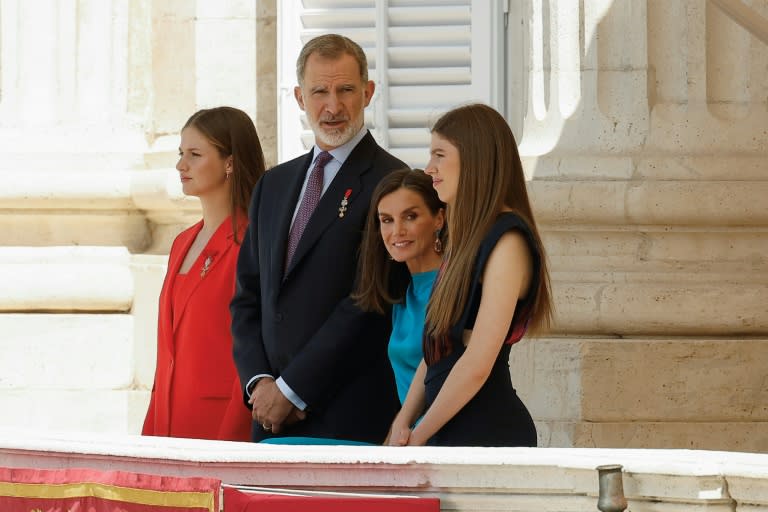King Felipe VI marks 10 tough years on Spain's throne

King Felipe VI on Wednesday marked the 10th anniversary of his accession to the Spanish throne, putting the spotlight on a decade of efforts to restore the image of the monarchy following scandals that led his father Juan Carlos to abdicate.
"During these years of service, commitment and duty have been the pillars of my action as king," he said during a ceremony at Madrid's Royal Palace.
Felipe, then 46, was sworn in at Spain's lower house of parliament on June 19, 2014, just 17 days after his father announced he would step down following scandals regarding his finances and love life that led many Spaniards to question the role of the monarchy.
"The king our era needed," El Mundo newspaper headlined on its front page on Wednesday, adding that the first ten years of his reign had "restored prestige to the Crown".
In his first speech after becoming king, Felipe promised "a renewed monarchy for a new era". He promptly ordered an audit of the royal household accounts and issued a "code of conduct" for its members.
The following year he stripped his elder sister, Princess Cristina, of her title as Duchess of Palma de Mallorca after she was indicted as part of a probe money laundering and fraud probe into her husband, Inaki Urdangarin.
In 2016, she became the first member of the Spanish royal family to stand trial since the monarch was restored in 1975.
The princess was ordered to pay a fine and Urdangarin was convicted and served a jail term of five years and ten months. The couple have since separated.
- The best system? -
In 2020, Felipe renounced any future personal inheritance he might receive from his father and stripped him of his annual allowance after fresh details of his allegedly shady dealings emerged.
Even though investigations of Juan Carlos's finances in Spain and Switzerland have since been dropped, Felipe has continued to keep his distance from his father, who left Spain for Abu Dhabi in 2020.
Juan Carlos came to the throne in 1975 after the death of longtime dictator Francisco Franco. He earned respect for his role in guiding Spain's transition to democracy.
But the money and sex scandals eroded his standing. Spaniards appear divided over Felipe's efforts to restore the image of the monarchy.
While 47.4 percent of Spaniards feel he has kept his promise of creating a monarchy "renovated for a new era", 45.1 percent disagreed, according to a poll published Sunday in El Mundo.
Some 49.6 percent believe a constitutional monarchy is "the best system" for Spain, while 40.4 percent disagreed, according to the poll.
- 'Serving everyone' -
Since Felipe's eldest daughter Leonor turned 18 on October 31 last year, the heir to the Spanish throne has had an increasingly public role.
She swore loyalty to the Spanish constitution that day in a ceremony in parliament, a necessary step for her to be able to succeed to the crown.
Felipe, wearing a navy suit and patterned tie, appeared on the balcony of the Royal Palace on Wednesday with his wife Letizia, a former TV journalist, and their daughters, Leonor and Sofia, as part of a ceremony marking his accession to the throne. The royal family waved to crowds gathered below.
During a gala lunch at the palace, Princess Leonor and her sister led guests in a toast to their parents.
"Because since we were born, we have been taught the value of this institution, of the Crown, its usefulness to our society and its purpose of serving everyone," Leonor said
CHZ/ds/tw

 Yahoo News
Yahoo News 
